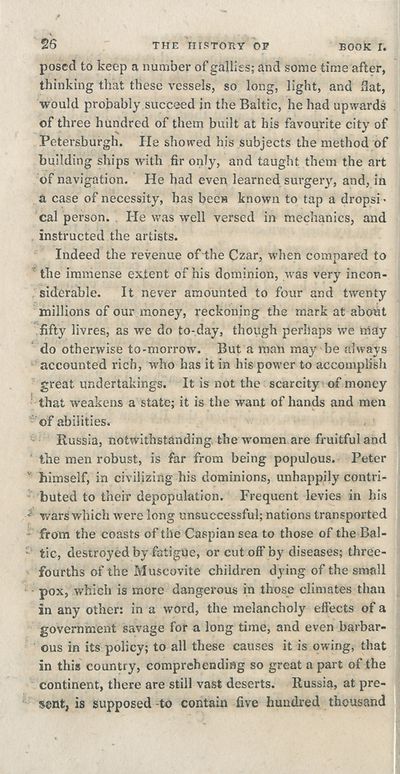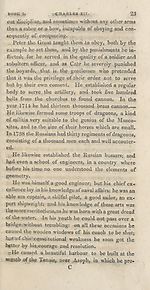Download files
Complete book:
Individual page:
Thumbnail gallery: Grid view | List view

26 the 'history op book r.
posed to keep a number of gallics; and some time after,
thinking that these vessels, so long, light, and flat,
would probably succeed in the Baltic, he had upwards
of three hundred of them built at his favourite city of
Petersburg!!. He showed his subjects the method of
building ships with fir only, and taught them the art
of navigation. He had even learned surgery, and, in
a case of necessity, has been known to tap a dropsi •
cal person. He was well versed in mechanics, and
instructed the artists.
Indeed the revenue of The Czar, when compared to
r the immense extent of his dominion, was very incon¬
siderable. It never amounted to four and twenty
millions of our money, reckoning the mark at about
fifty livres, as we do to-day, though perhaps we may
do otherwise to-morrow. But a mad may be always
accounted rich, who has it in his power to accomplish
great undertakings. It is not the scarcity of money
that weakens a state; it is the want of hands and men
of abilities.
Russia, notwithstanding the wmmen are fruitful and
the men robust, is far from being populous. Peter
v himself, in civilizing his dominions, unhappily contri¬
buted to their depopulation. Frequent levies in his
;; wars which were long unsuccessful; nations transported
from the coasts of the Caspian sea to those of the Bal-
- tic, destroyed by fatigue, or cut off by diseases; three-
fourths of the Muscovite children dying of the small
pox, which is more dangerous in those climates than
in any other: in a word, the melancholy effects of a
government savage for a long time, and even barbar¬
ous in its policy; to all these causes it is owing, that
in this country, comprehending so great a part of the
continent, there are still vast deserts. Russia, at pre¬
sent, is supposed to contain five hundred thousand
posed to keep a number of gallics; and some time after,
thinking that these vessels, so long, light, and flat,
would probably succeed in the Baltic, he had upwards
of three hundred of them built at his favourite city of
Petersburg!!. He showed his subjects the method of
building ships with fir only, and taught them the art
of navigation. He had even learned surgery, and, in
a case of necessity, has been known to tap a dropsi •
cal person. He was well versed in mechanics, and
instructed the artists.
Indeed the revenue of The Czar, when compared to
r the immense extent of his dominion, was very incon¬
siderable. It never amounted to four and twenty
millions of our money, reckoning the mark at about
fifty livres, as we do to-day, though perhaps we may
do otherwise to-morrow. But a mad may be always
accounted rich, who has it in his power to accomplish
great undertakings. It is not the scarcity of money
that weakens a state; it is the want of hands and men
of abilities.
Russia, notwithstanding the wmmen are fruitful and
the men robust, is far from being populous. Peter
v himself, in civilizing his dominions, unhappily contri¬
buted to their depopulation. Frequent levies in his
;; wars which were long unsuccessful; nations transported
from the coasts of the Caspian sea to those of the Bal-
- tic, destroyed by fatigue, or cut off by diseases; three-
fourths of the Muscovite children dying of the small
pox, which is more dangerous in those climates than
in any other: in a word, the melancholy effects of a
government savage for a long time, and even barbar¬
ous in its policy; to all these causes it is owing, that
in this country, comprehending so great a part of the
continent, there are still vast deserts. Russia, at pre¬
sent, is supposed to contain five hundred thousand
Set display mode to:
![]() Universal Viewer |
Universal Viewer | ![]() Mirador |
Large image | Transcription
Mirador |
Large image | Transcription
| Antiquarian books of Scotland > Kings & rulers > History of Charles XII, King of Sweden > (46) |
|---|
| Permanent URL | https://digital.nls.uk/115021562 |
|---|
| Description | Thousands of printed books from the Antiquarian Books of Scotland collection which dates from 1641 to the 1980s. The collection consists of 14,800 books which were published in Scotland or have a Scottish connection, e.g. through the author, printer or owner. Subjects covered include sport, education, diseases, adventure, occupations, Jacobites, politics and religion. Among the 29 languages represented are English, Gaelic, Italian, French, Russian and Swedish. |
|---|

